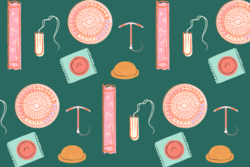"Lech" Complicates Familial Relationships
Before cracking into Sara Lippmann's novel, Lech, be sure to take a look at the last epigraph. Lippmann gives three quotes to the reader, one from Arielle Greenberg, another from Crosby, Stills, Nash & Young, and a final one from Bereshit 12:1, Parshat Lech Lecha. "Lech Lecha," God's charge to Abram, translates to "Go forth. Go for you." Abram (later renamed Abraham by God) is directed to go from his homeland to a new one, where his name will become great and a nation will be established. With this in the front of your brain, get reading.
Lech is set in Sullivan County, New York, an upstate community whose characters live in a grim world: one of secrets, addiction, longing, and the specter of the mysterious death of Chaya Bloch, the 26-year-old Hasidic mother whose naked body was found in Murmur Lake before the novel begins. The novel's chapters vary in length and perspective, each from the point of view of a different character: Noreen Murphy, a Sullivan County realtor seeking to sell the cursed property at Murmur Lake; Paige, Noreen’s teenage daughter; Tzvi Bloch, Chaya's son; Ira Lecher, the current owner of the house on Murmur Lake; and Beth Barkman, a temporary tenant on Murmur Lake. Throughout the novel, Lippmann uses these characters to construct complex narratives around parenting and family.
When we meet Beth, she's driving away from New Jersey (and her husband Doug) to Murmur Lake, bleeding from the abortion she had two days ago. In the car with her is her son Zach, a tiny, precocious preschooler with an army of severe allergies. As she drives, Beth silently lists the things she needs for the last-minute trip, her attempt to reboot and reconsider motherhood. However, at the property on Murmur Lake, where Beth has chosen to spend two months of the summer collecting herself, she's crushed by a repetitive internal monologue: children are the most important thing that can happen to a woman.
This same narrative—that abortion will destroy one's mental health—has been crafted by anti-abortion forces and is ubiquitous in mainstream media. And while Beth does experience shame, Lippmann's portrayal of her abortion experience and its aftermath is far more nuanced and reflective of reality. Beth already has a child, which makes her experience a statistically accurate representation of someone having an abortion (according to the Guttmacher Institute, 59% of abortions are obtained by people who already have children). While we're told of her post-abortion bleeding, it's by no means the horror show it's often depicted as, and it soon ceases to be an issue.
Beth's abortion allows her to literally "go forth" (as Abram is told to do in Bereshit) to Murmur Lake for some time to pause and assess her life, without sinking into what for her would be the morass of having another child. Lippmann's handling of the abortion storyline demonstrates that when abortion stigma does surface, it's often not about the abortion itself, but the result of how anti-choice manipulation has managed to seep into every one of us.
Beth isn't the only character in Lech negotiating motherhood. Noreen Murphy, who gave birth to her daughter Paige as a teenager, regards Paige’s birth as having "kept her from the worst of herself," but also not a complete redemption: Noreen longs for something of her own, and an identity outside of her daughter. When Paige leaves town, a goal she's been working towards for the bulk of the novel, Noreen must come to terms with what that means for her future as an individual, as well as a person still contending with a painful past marked by sexual violence.
The men of Lech also grapple with familial relationships and the emotional fallout of Chaya’s death. Ira, whose young daughters found Chaya’s body, ponders his failures as a father, a formerly religious Jew, and a husband. Like Beth, he's fled a somewhat chaotic yet monotonous life for Murmur Lake. Estranged from his now-grown daughters and wife, he spends the novel reflecting on the impossibility of truly escaping his past.
While the reader gets several long chapters to engage with Ira in his own words, that's not the case for Tzvi, Chaya's son, who continues to feel the vibrations of the tragedy. Tzvi's chapters are small and brutal, and they contain some of the most moving contemplations about parenthood, including realizations about who his mother was, and, restrained by her conservative community, who she never had the opportunity to be. A physically and emotionally traumatized Tzvi struggles as he separates from observant Judaism, and as he attempts to heal, he reflects on how little he actually knows about his mother. If she too were in deep pain, where would she have gone for help?
"Everyone loves a meaningful tragedy," says Beth. And while Lech indeed supplies us with tragedy, even beyond the death of Chaya Bloch, the meaning of said tragedy isn't always clear. As the novel's characters excavate their lives and choices in search of logic and clarity, they're ultimately left with this truth: What we're told to believe about ourselves and the world is never all there is. In spite of attempts to convince us otherwise, parents exist as separate beings with complicated desires, and they too feel called to "go forth" beyond a two-dimensional narrative.







